8 de octubre 2018

Children of Exile: The Births “Sowing Hope” in the Camp of Nicaraguan Farmers

PUBLICIDAD 1M
PUBLICIDAD 4D
PUBLICIDAD 5D
Renowned Nicaraguan athletes have been victims of physical aggression because of their participation in peaceful marches against Daniel Ortega.
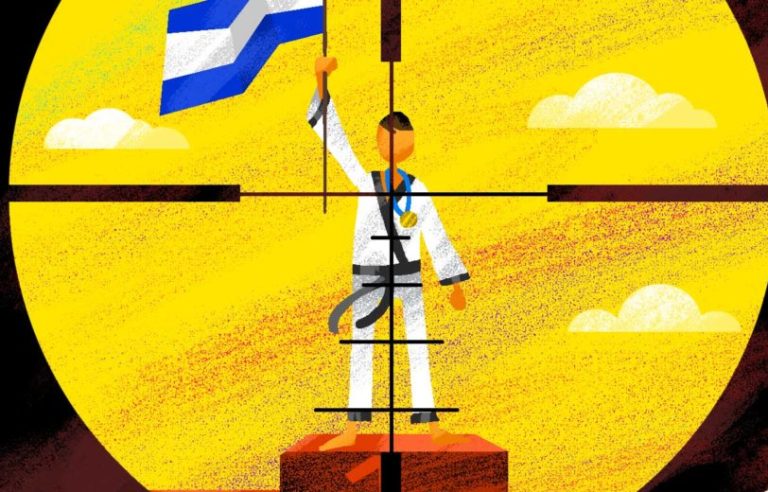
Illustration by CONFIDENCIAL
Nicaragua has become an unsafe country for any citizen who protests and makes use of the right to free expression. Athletes who have represented Nicaragua and won medals in important international competitions are now victims of harassment, threats and physical aggression. Many of them have gone from being considered sports heroes by the powers that be to being seen as “terrorists” for participating in the marches and protests that began five months ago.
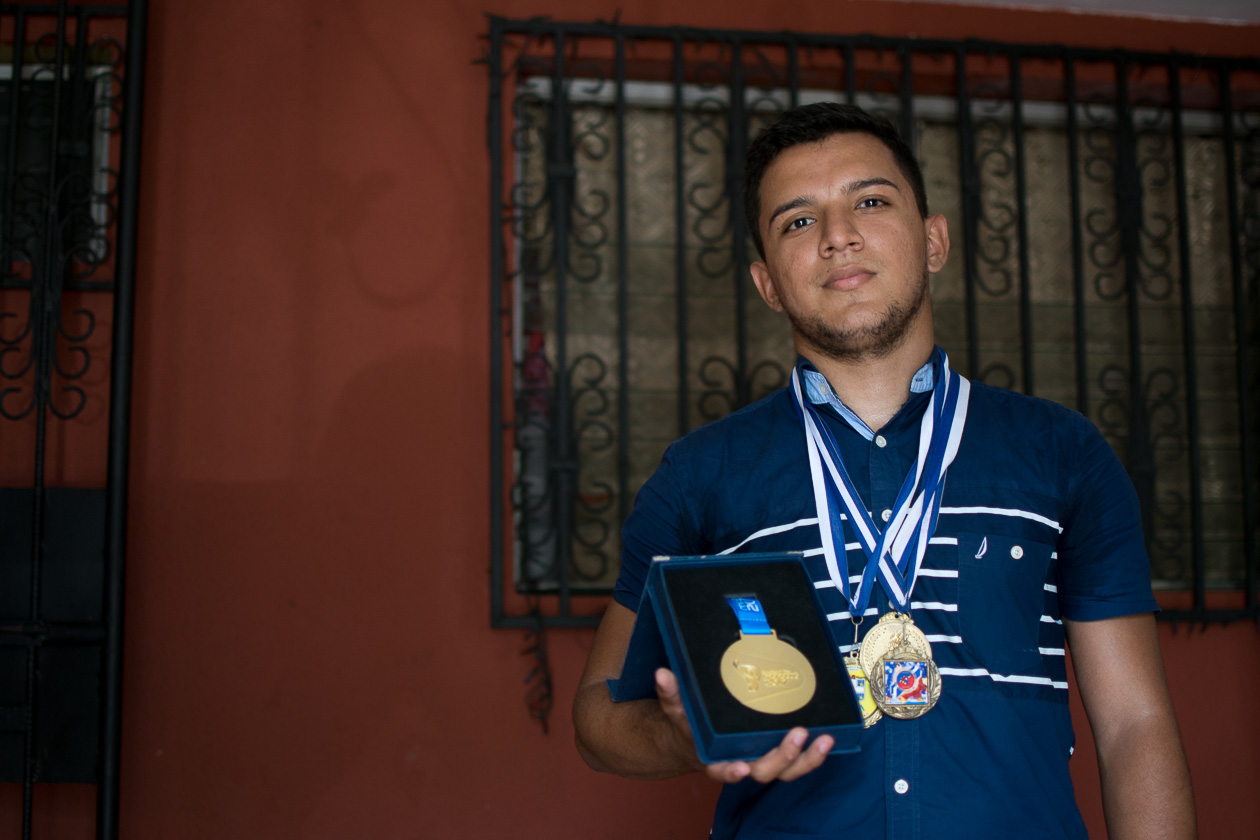
Broderick Hernández won a gold medal in sambo in the XI Central American games.: Photo: Franklin Villavicencio
It was less than a year ago that Broderick Hernandez won a gold medal in the XI Central American Games Managua 2017, which the Nicaraguan government organized with much pomp and celebration.
Six Nicaraguan athletes, including this young man, took the podium to collect their golden medals in the discipline of sambo.
Their victories brought much joy to the country. Broderick said that triumph will always remain in his memory. He remembers when he won the gold medal in the 62 kg class by winning 1-0 against Honduran Elvin Cruz. This young 20-year-old man now fears that the same government that celebrated him will arbitrarily detain or kill him. His crime? Taking to the streets for justice and democracy in the demonstrations demanding that Ortega step down.
His fear is not unfounded. Broderick never imagined that, five months after his great accomplishment, he would be in a hospital, injured and with his arm broken, after being beaten by Ortega’s paramilitaries. Broderick took part in several peaceful demonstrations and, in fact, on April 18th he was attacked in the capital when Ortega supporters went after citizens who were protesting against Social Security reforms the government wanted to impose.
He had to throw himself into a drainage ditch so the mobs of the Sandinista Youth and the riot police were not able to reach him. That experience did not stop him, and he continued to demonstrate.
Almost a month later, on May 17, Broderick attended a sit-in at the Metrocentro roundabout, in solidarity with the mothers of those killed in the protests up to that date. He remembers that at the end of the sit-in, he and a friend went to wait for their ride. While they were waiting, a Hilux truck pulled up in front of him. Broderick remembers that two men got out of the truck — one with a gun and another with a metal tube. Broderick’s only crime was to carry a flag as a cloak on his shoulders, just as he had done on December 17 when he won the gold medal. He went from being a sporting glory to a “terrorist”, in the eyes of the Ortega regime.
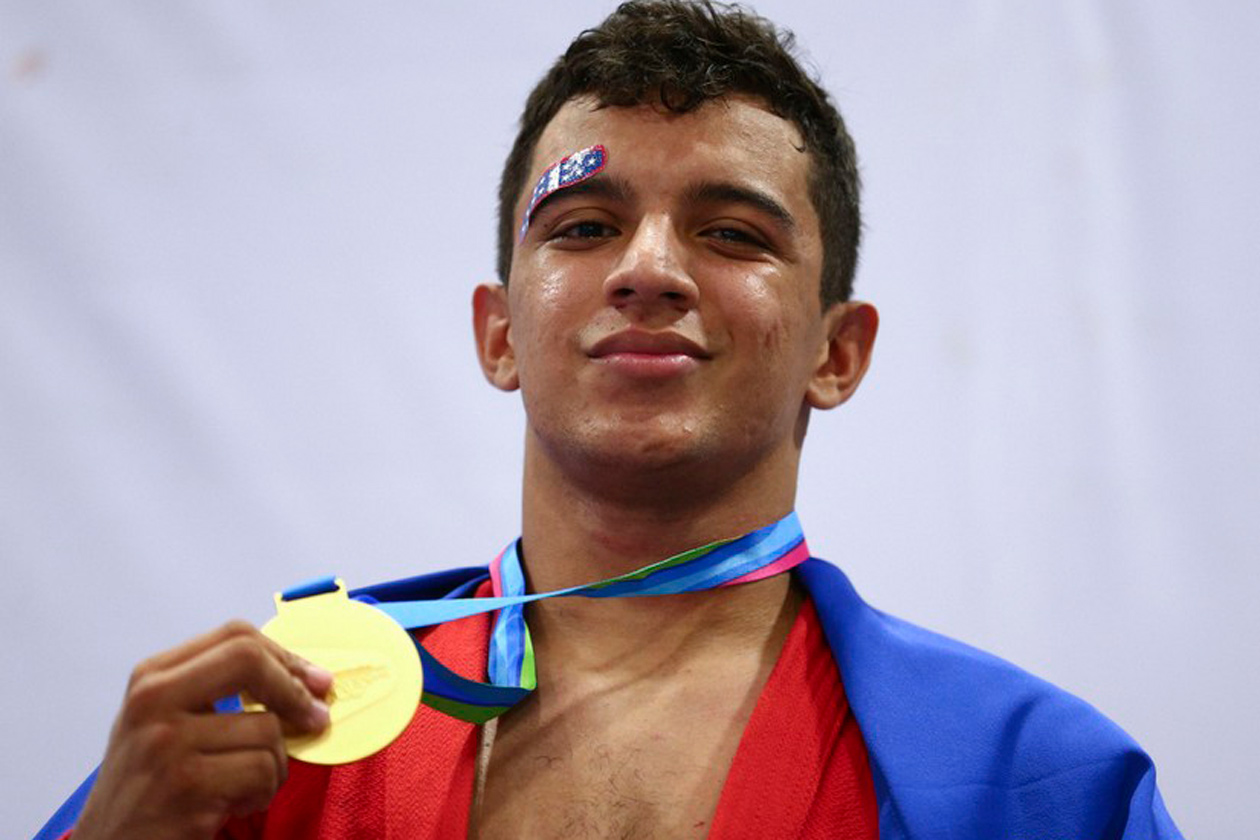
Broderick Hernandez wears the Nicaraguan flag like a cape after winning his medal. El 19 Digital
“The one with the gun grabbed my friend and the one who was carrying the tube started hitting me with that,” he recalls. He tried to defend himself, but in the midst of the kicks and the blows from them, he felt that his air was running out. He barely managed to get out “Dude, please don’t kill me.” He thought they really were going to kill him. Another person got out of the truck. There was a moment when the blows stopped. The man shouted at them: “you’re the ones taking down the chayopalos!” (The large metallic trees, erected by Vice President Rosario Murillo, which dotted Managua’s landscape before the demonstrations began.)
Then the aggression continued. Even though people were still on the street, nobody stopped to help them out of fear. Fifteen minutes later, the beating ended. Arriving at his house, Broderick, beaten and stunned, told his family what had happened to him. “I took the worst of it. They cracked my head and fractured my forearm,” he recalls. The young athlete decided to go to a public hospital in Managua, though he feared he might not receive attention due to order the government had given the doctors not to treat opposition government demonstrators. He told them he had been assaulted near his house. “If I had not said that, they would not have treated me,” he laments.
From being acclaimed by the State to becoming its enemy
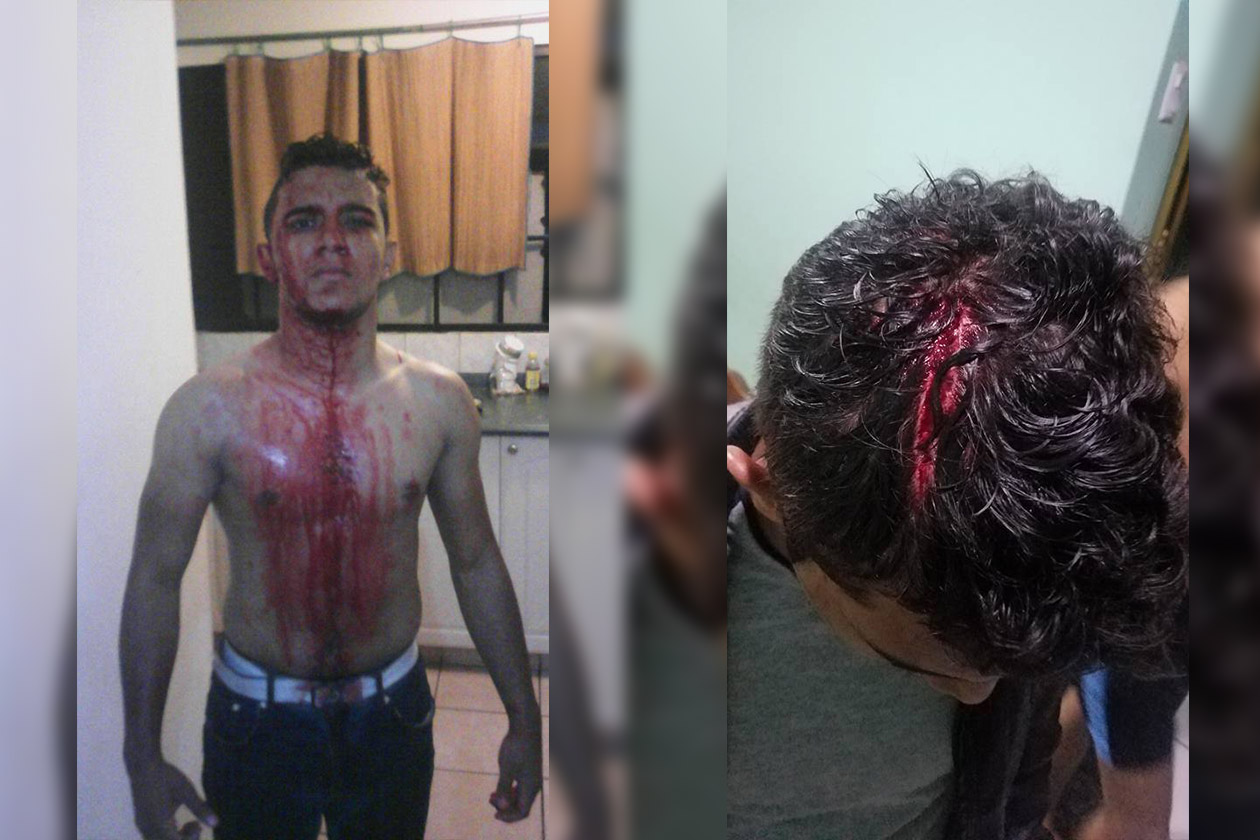
Broderick Hernandez after being beaten up by paramilitary forces.
At the opening of the Managua 2017 Central American Games, Broderick passed through a hallway in the Dennis Martinez National Stadium shortly before the ceremony began. Outside, hundreds of people were waiting to applaud him and the other athletes. “When they took us to enter the field, to introduce our delegation – to see all those people clapping and taking pictures was incredible,” he says. The young man devoted months to his pre-competition training.
He spent his days between the classrooms of the law faculty of the Central American University (UCA) and the training gym at the National University (UNAN). The last months before the competition, he was sent to Cuba for further training, on a trip financed by the Nicaraguan Sports Institute. Everything paid off. On December 17, he won first place in his category and all the media, including the ruling party, cheered his name.
Now Broderick felt persecuted, and helpless. They wrote to him revealing personal information they had about his family. “They were telling me they knew who my parents were, how old they were,” he says. After that, he decided that it was best to eliminate government supporters from his Facebook page.
“It’s 1:57 pm. I am not at home right now. I am scared to go home”, were the words the athlete used to begin a live video on Facebook, after he had been attacked by the hooded paramilitaries. “I said that I was afraid, for myself, for my mother. I knew that it would go viral and that it was something that I had to share,” he said after leaving the hospital.
After it went live, he began to get threatening messages on Facebook. “I got a lot of threats,” he said. And they were not only for him, but for his family as well. Still in a cast and with stitches in his head, Broderick kept going to the marches. Although he still is fearful that something violent could happen to him again, he continues to demonstrate. He says he will keep exercising his right to free expression.
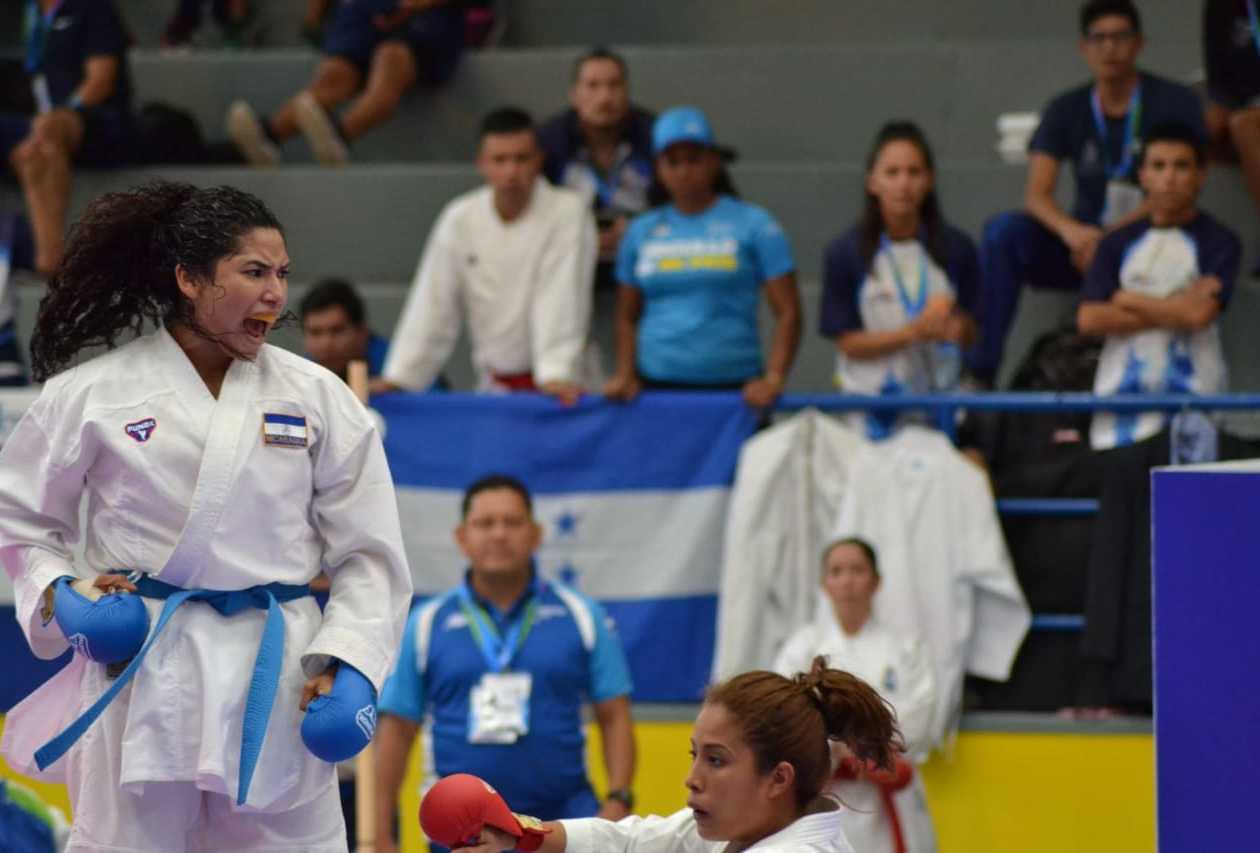
Katherine Arauz in the XI Central American Games, Managua 2017.
Four months before the protests began in Nicaragua, Katherine Arauz was on the podium to receive her silver medal in the XI Central American games in Managua. Today she is recovering after being shot during a peaceful protest.
Katherine and her Karate Do team received a silver team medal, and she was also awarded an individual bronze medal.
Her victory caused a stir in Nicaragua’s sports community, and much adulation from the Ortega government’s media.
Katherine was wounded during a demonstration when she was trying to defend an older woman from a group of riot police. From point-blank range, one of those police officers shot her with a rubber bullet, which ended up in her leg. Her life has not been the same since.
On April 20th, Katherine was with a friend, collecting food for the students at the Polytechnic University (UPOLI), after the protests against Ortega’s government began and students started to take over the universities.
She felt the need to be there, helping the young students who were being attacked by the police and paramilitaries right outside the university. “I couldn’t stay home, knowing what was going on,” she remembers.
After being outside the university all morning and part of the afternoon, Katherine decided to join an impromptu walk. It all started quietly for her, and along with her friends, she was one of hundreds of people who were protesting in the peaceful march.
Among all the people who were at the march, Katherine felt particularly moved by one special person: an elderly lady who was carrying the flag of the Church. “I am Catholic, and that really spoke to me, but I was worried that the woman shouldn’t be there, because it could be dangerous,” she says.
When she got to the Alexis Argüello monument, she met up with a wall of police that wouldn’t let her pass. In spite of that, she did not turn back and kept walking until the riot police began to shoot. Everyone nearby started running. Katherine started running, too, until she realized that the older woman she had seen earlier was paralyzed with fear and the riot police were closing in on her.
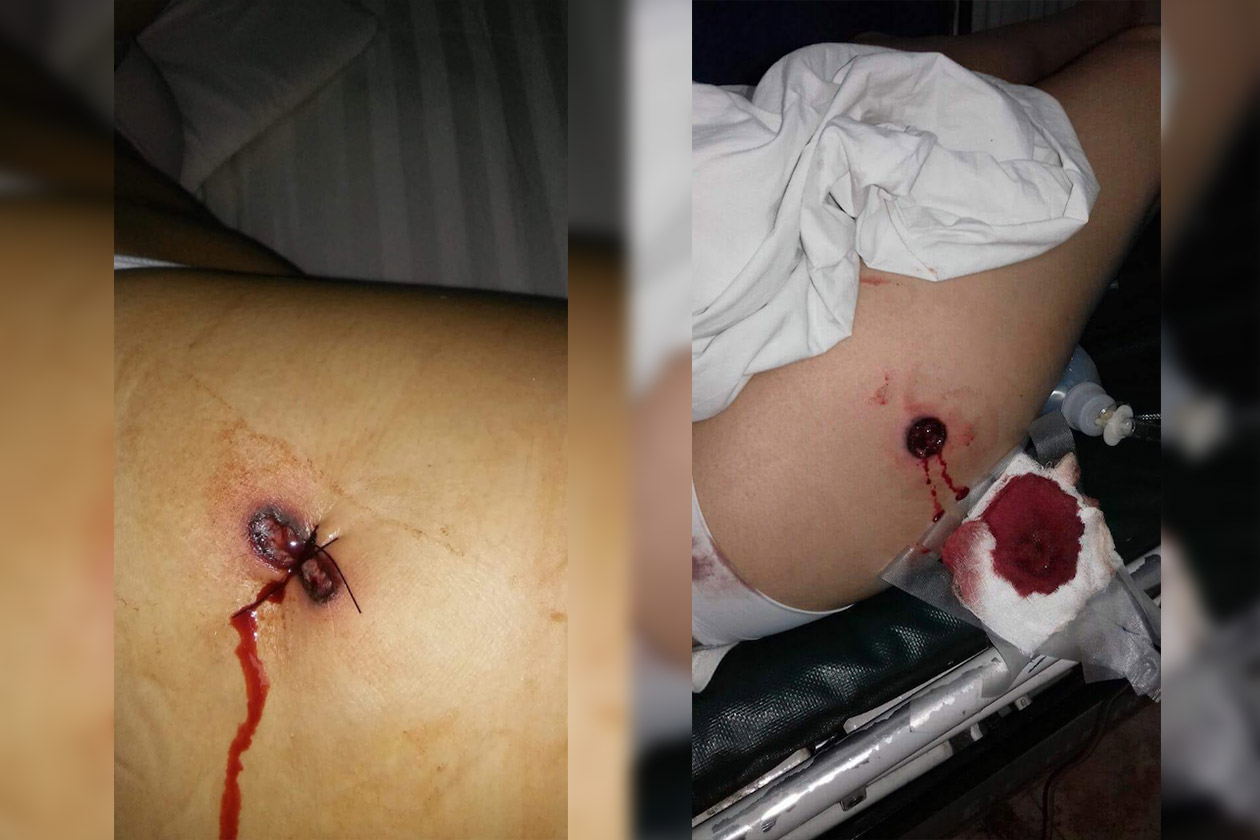
Katherine Arauz’ leg, after being hit by a bullet.
“I went back and I was telling the police to leave her alone, that she wasn’t doing anything, that we weren’t armed, that they should stop shooting at us,” she said. When the riot police saw that the young woman was challenging them, they tried to take her into custody, and Katherine only heard, “take her away, take her away”. Two of the riot police were ready to take her, but she defended herself and one of the riot police ended up on the ground. Seeing that, the other riot police went after her.
“There were like 10 riot police on top of me, trying to grab me and hit me, and I felt like I had gotten hit really hard in my leg,” she says. At that moment, she didn’t really pay much attention to her leg, as she was just trying to get out of there. A few minutes after that blow, all she could hear was “leave her alone, just let her leave, let her leave”. And she was able to flee. She found the older woman, who was hiding nearby, took her by the hand and walked towards a safe place. Along the way, she smelled blood … her blood.
When she arrived at a nearby shopping center, Katherine got in an ambulance that took her to a public hospital in Managua. She thought that they would not treat her because she had been protesting. They extracted a rubber bullet from her leg, and she asked for the bullet as evidence, but they told her they could not give it to her. She has been recovering ever since.
The first months of recovery were difficult for Katherine. “I felt so frustrated and disappointed, but I finally started to feel a little better in the third month,” she remembers.
On the day that Katherine Arauz won two medals for Nicaragua, she says she felt “very happy and that all the effort had been worth it”.
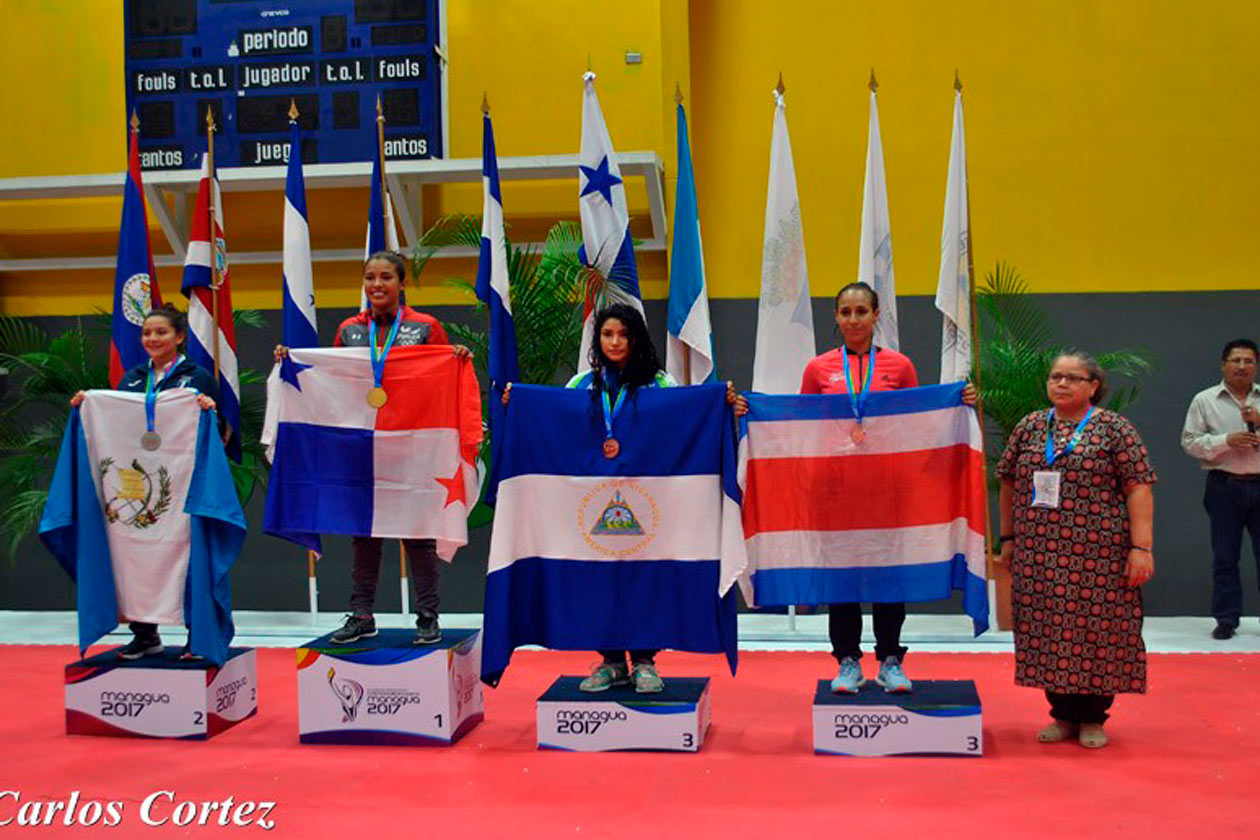
Katherine Arauz (third from left) at the XI Central American Games, 2017. Photo: Carlos Cortez
This 25-year-old has been part of the National Karate Do team since 2010. She has represented Nicaragua in international competitions and won medals that put Nicaraguan sports in the international spotlight.
Nevertheless, after the shooting, she still can’t train with the team. She had dedicated her life to training four hours each day. She would take her training clothes and equipment with her as she went to class and work. Her days were training, studying and working.
She was one of the most beloved athletes of the National Team of Karate Do in Nicaragua. It makes her sad to think about all she did for sports in Nicaragua, only to now see that she, and everyone who took part in the peaceful marches, has been labeled a “terrorist”.
“Sometimes I think it can’t be possible that, as athletes and not being bad people, that they would see us this way, after everything we’ve given, after all that we’ve done to lift up Nicaragua’s name,” she says.
She points out that she still has an “open door” and that she has not rejected being part of the National Karate Do Team or of training alongside the other members of the team. She continues to recover but hopes to return to competition soon and to represent Nicaragua both nationally and internationally.
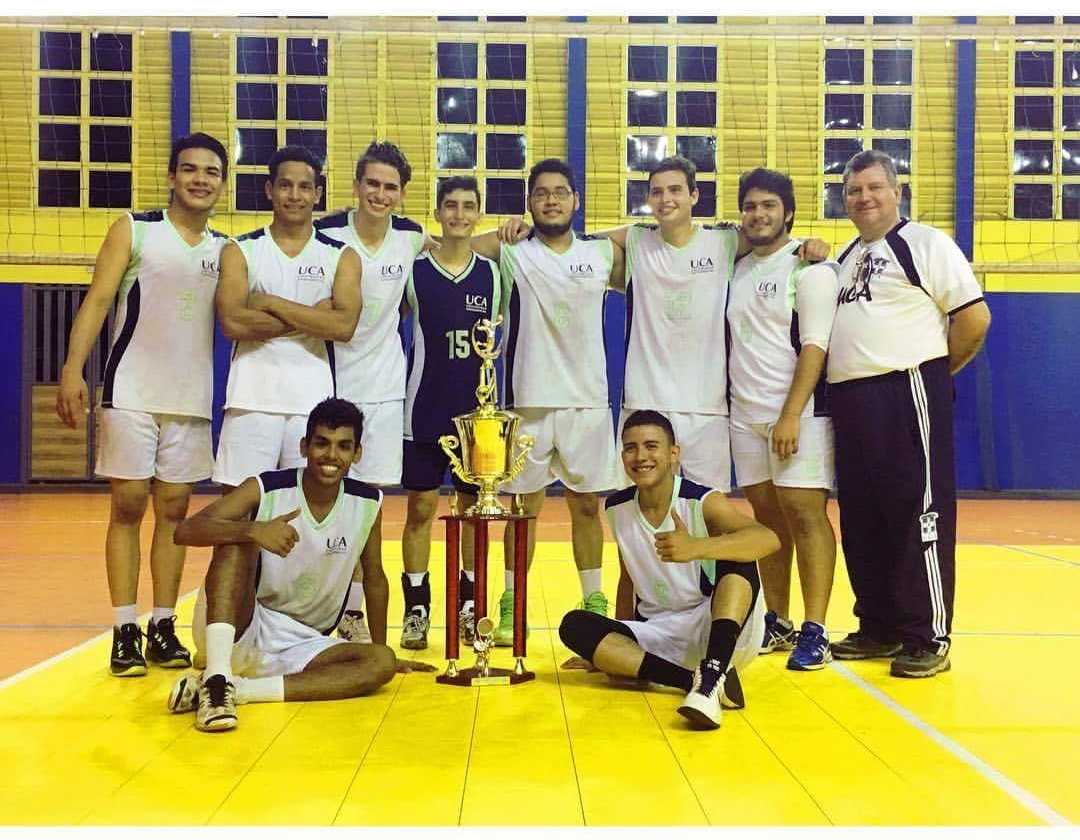
Manuel Rodríguez (standing, second from left) University Champion in Volleyball
At the beginning of 2018, 25-year-old Manuel Rodríguez divided his time between classes in the Department of Engineering at the UCA and training in volleyball and judo. His life was very normal. Today he is exiled in Spain, after having received both physical and verbal threats, merely for having protested against the government. “Nothing is normal anymore,” he says.
Manuel has represented Nicaragua throughout Central America in judo and volleyball, within the university leagues. 2017 was his year. He won the bronze medal at the club level in the Central American Judo Championship in El Salvador; he was a university champion in men’s volleyball, runner-up in the University Pentathlon and winner of the prize for best athlete in the Pentathlon. His progress has been so good that he was poised to join the National Judo Team. However, the country’s crisis, along with all the threats against him, forced him to leave for Spain.
On April 18th, the young man was in judo training at the UCA until fairly late. He hadn’t practiced for about two weeks, but that day, along with other teammates, he decided to take it up again. Things were normal that night, until they started to hear screams from outside of the university. He went to see what was going on and found something horrific and unexpected: government mobs attacking student demonstrators with stones and clubs. He felt that he needed to document what was happening, so he started to tape what was taking place in front of his eyes. “They attacked several students. I started streaming it live on Facebook to have evidence that they were the ones attacking the muchachos”.
He remembers seeing young people running all over, desperate with fear. Manuel, along with the Dean of the university and other people, coordinated rides home for the demonstrators, some of whom come from outside of the capital city. According to Manuel, it wasn’t until 12 midnight that the last student left the university. “They had to leave very carefully, because once they left, they were being followed, and attacked. A few people got beat up that way,” he remembers.
The athlete was not content to leave things like that. He was upset and felt that he needed to do something. The following day, he and students from other universities, got people together and decided to march. “On the 19th we were 50 or 60, and then more and more people started joining us,” he says. That day was historic for him, to see students from so many different universities coming together in one struggle.
It was almost noon when Manuel saw a riot police officer, from inside a small sentry stand, fire on people who were not part of the march. Along with some other young people, he started throwing rocks at the officer, to get him to stop shooting. The officer looked at them menacingly, but that didn’t stop Manuel from trying to stop the violence, until the officer shot him.
Manuel suddenly felt a burning sensation in his right shoulder and saw that he had been hit by a rubber bullet. He was wounded.
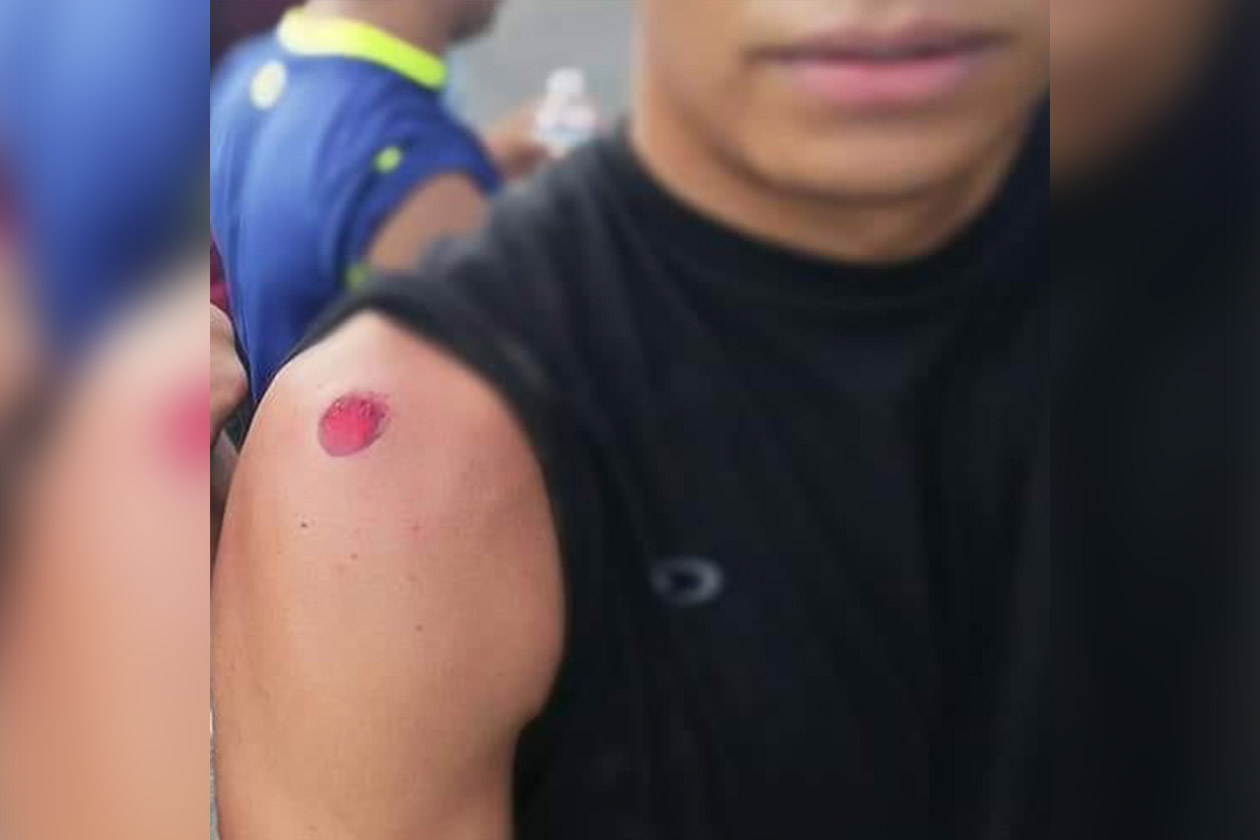
Wound from a rubber bullet in Manuel Rodríguez’ shoulder.
Given this situation, Manuel had to leave Managua and return to his hometown of Ocotal, but his struggle didn’t end there. In Ocotal, Manuel went to marches, took part in the barricades and was active “in the struggle”. He continued to make videos with his cellphone as evidence of the situation unfolding in Nicaragua.
Manuel was part of the first barricade that went up at the Yalagüina junction, between Somoto and Ocotal. He says that the point wasn’t to make a barricade, but rather to have a large presence of people near the junction, as the city of Ocotal was under siege from the paramilitaries – but given the situation, they opted for a barricade. “It was spontaneous,” he says.
The barricade was in place for about two hours, until the paramilitaries came to attack. “One of the people with us had a mortar blow up in his arm, and so we decided to leave,” he says.
The next day, people from the nearby town raised up the barricade again. But Manuel stopped participating for his own safety. And that’s when the attacks on him by Ortega sympathizers began.
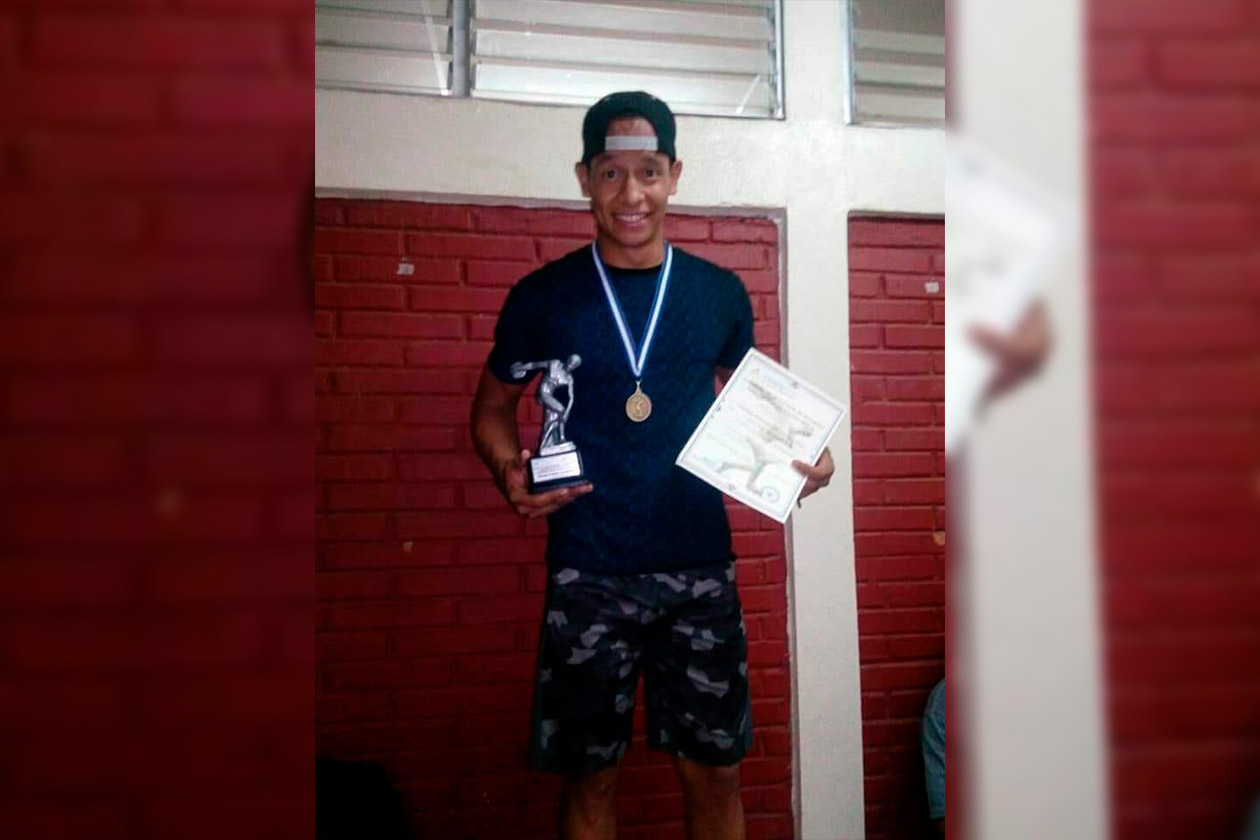
Manuel Rodríguez, winner of the prize for best athlete at the University Pentathlon, 2017.
Leaving Managua did not mean he was no longer a target of threats. He was the target of verbal threats in Ocotal by members of the Sandinista Youth and workers from the mayor’s office. “They called my phone, saying they knew where I was, and that I had been protesting,” he said.
Manuel knew the people who were threatening him. Since then, his mother, who currently lives in Spain, told him that it would be better for him to leave the country. “I knew all of them, and more than anything it was for my family that I had to leave,” he said.
On August 15th, Manuel Rodríguez left Nicaragua for Spain. It was “uncomfortable” and “a little delayed” getting through immigration in Nicaragua, but it worked out. He says he is getting used to Spain but that it has been a little complicated for him.
He is currently planning to take a course in culinary studies, which begin in October. In spite of the fact that he would like to return, he doesn’t feel like that is possible until there is an improvement in the country’s situation – which he sees as getting worse and worse.
Archivado como:
PUBLICIDAD 3M
PUBLICIDAD 3D